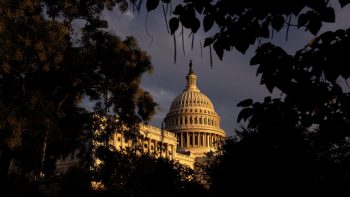Georgia could lose federal money for poverty assistance
On a walk through the cavernous Atlanta Community Food Bank, Danah Craft points out what she said is a vital food item: a jar of peanut butter.
For a family relying on food banks, peanut butter is an important source of protein. “This is the kind of food that helps families put a balanced meal on the table,” Craft said.
Craft heads the Georgia Food Bank Association. The group helps distribute millions of pounds of food to the state’s eight regional food banks, but it can’t always rely on what’s donated to meet the needs of Georgia’s poor.
To fill the nutritional gaps, the association buys food staples with funds from the federal Temporary Assistance for Needy Families program, more commonly known as TANF.
Each year, Georgia gets about $330 million in federal funds for the program. It then distributes some of that money to nonprofits, like the food bank. But the state may not be able to keep giving out that money.
TANF, which gives critical temporary assistance to poor families, is set to expire at the end of the month. As lawmakers debate its renewal, they’re taking a hard look at an accounting sleight-of-hand – one that could leave Georgia with a nearly $100 million budget hole for state anti-poverty programs.
“I think you can’t undersell the negative impact that it will have on our state and especially on the poorest of the poor,” said Bobby Cagle, head of the Georgia Division of Family and Children Services.
Here’s why the state could lose the money. To get the $330 million in federal TANF dollars, the state must put in $173 million of its own money on services for the poor. But it doesn’t have to do the actual spending. Last year, the state only put in $74 million. The remaining $99 million was spent by nonprofits, like the food bank. That still counted as state spending under TANF.
Now, Congress and the President are separately looking at ways to end the practice of counting third-party dollars as state spending. Critics argue states like Georgia are to blame for ending up in this situation, because they cut their own spending and filled the holes with federal money. Congressman Lloyd Doggett, a Texas Democrat, is among those critics.
“A significant amount of dollars have essentially been used by the states during the ups and downs of the budget and the economy to supplant what the states were or should have been doing,” Doggett said at a recent House Ways and Means Committee meeting.
A 2011 Congressional study found Georgia and Utah far outpaced other states in using third-party dollars to meet state spending requirements.
Cagle, though, said the budgeting scheme was necessary during the recession, when state funds were short. He said should Washington change the accounting rules, Georgia would have to find $99 million quickly, or risk losing federal TANF dollars. As a result, the state would likely cut TANF handouts to nonprofits, which have come to depend on the money as demand for their services grew during the recession.
The possible change worries Dana Craft, of the food bank, as she surveys boxes of canned tuna, collard greens, sliced carrots and peanut butter.
“The food bank has a list of the most needed items, but that’s not always what comes in at any given time,” she said.
Craft hopes the government will figure out a way to keep the food bank’s shelves stocked. But family services director Bobby Cagle said it’s not a foregone conclusion the state will put the money in this year.
There’s a lot happening in the world. Through it all, Marketplace is here for you.
You rely on Marketplace to break down the world’s events and tell you how it affects you in a fact-based, approachable way. We rely on your financial support to keep making that possible.
Your donation today powers the independent journalism that you rely on. For just $5/month, you can help sustain Marketplace so we can keep reporting on the things that matter to you.


















